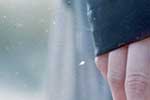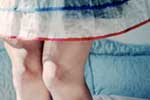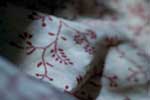Winter 2015: Prose
Left As It Was, It Would Come Apart
Non-fiction by Jackie Shannon-Hollis
In a small town with a high school of just over a hundred kids it is possible to be many things. I was a popular girl, honor society president, an actor in every school play, the girl who friends came to with their problems. I was the dance team leader, a setter on the volleyball team, a princess at the prom, and I was a slut. I excelled.
The boys I would be with were the older ones, most of them already graduated from high school. They smoked pot and partied and knew things about cities and music and drugs and the world. Things I thought I should know, things I wanted to know. They asked me out. They took me for a drive. I didn’t say no. Word got around.
Each time, with each new boy, there was that first urge and pull, the hot breathlessness of it, and the possibility that this boy could do for me what I did for myself when I was alone: bring pleasure and relief. There was the possibility he could give me love and I could give it to him and we could go on like that, romance and love, passion under the moonlight, in the backseat of a car. But this didn’t happen. They were boys and they knew even less than I knew.
There were girls with serious boyfriends. Girls already planning to marry after high school, to stay in our small town, to start a family. This was not my plan. This was not my mother’s plan. She’d been talking about college since the end of my sophomore year, talking about it like it was my idea, something that would happen, not a question. Talking about it long enough that I did think it was my idea. This is where my mother’s attention was. She saw to it that I made it home by curfew, kept up with my grades, sports, plays, dance team, chores. She didn’t know about the rest. All those boys. All those backseats.
One night I drove home from a party, whiskey and beer and cigarettes and boy on me. I drove the highway slow and careful and drunk, took the turnoff to our farm, up the gravel road, lights of the house ahead.
Mom would be awake as she was always awake, waiting for her family to come home. But the older kids were grown and gone. Cris was a child, already in bed. Dad was still out at the bar like he had been most nights for years while she waited, while I waited, we all waited. While we looked for his lights in the driveway, felt the disappointment when he finally came home, drunk and distant. She had stopped waiting for him. He would be home sometime. I was the one to wait for now, the only one Mom expected.
I parked in the driveway. Turned the engine off. Mom there in her chair in the lamp-lit picture window. TV flicker. I got out slow and careful, held myself on car door, hood of car. Steadied on the picket fence, the gate, deep whiskey breath, up the sidewalk, legs like bendy straws, up the porch steps.
I opened the front door and stood there, loose-eyed, sway in my legs. Mom had a pad of thick art paper on her lap, calligraphy pens spread out around her. Some old movie on the TV.
“Hi,” I said, the thick drunk of it in my throat.
She looked at the clock. One a.m., right on time.
“Hi,” she said. Her eyes up and down on me.
I started past her to go to the bathroom. My shoulder bumped the wall, and I caught myself there, looked to see if she saw. This was where Dad stood, all those nights when he finally came home, his dinner dried up in the oven, us kids on our way to bed.
Mom sat up straighter. “Are you drunk?”
He would ask us what we’d learned at school that day. Stand there, the top of him making small swaying circles. We gave one word answers, “Fine, okay, good,” knowing he wouldn’t remember in the morning.
I turned the rest of the way around, stood up tall. “No,” I said to Mom, tried to hold my eyes steady on hers. Like that would prove it.
She didn’t blink. “You are,” she said.
“I am not,” I said.
She looked back at the paper in front of her. “It’s not good for a girl to get drunk.” The careful lettering in black ink. Lines and swirls. “It’s not ladylike.” She said it like another mother-daughter talk. “You’re just supposed to get a glow on. A drink or two,” she said. “To feel happy. That’s all. Otherwise it’s sloppy. And ugly.”
Her innocence floated in the air between us. I squinted at her. I used to think she could see through me. But she had no idea how much I drank, how many cigarettes I smoked, what that boy and I had just been doing in the backseat of my car.
She picked up her pen. She drew slow inky lines on the thick paper and the paper took that ink in.
I felt a love for her then, warm in my face and chest; and a little sick, tight in my stomach, an ache. That she still believed in me. Believed I was good. That she could still teach me the ways to be a lady.
* * *
A few months later, Mom smiled a quiet smile when I asked if she and Dad would be chaperones for the high school prom.
“I was voted princess,” I said.
“Your dad will be tickled you asked.” Her smile went bigger. “Me too.”
For a moment, I imagined we were that kind of family, like the families of my friends who didn’t have secrets to keep from their parents.
On the night before prom, I left the pink satin dress I’d made in Home Ec hanging on the coat closet door. The pattern was sexy, like an old-fashioned movie star, and the dress almost looked like that. It showed off my strong shoulders, my slim waist. But I’d made that dress with the opposite of the care I’d put into Dad’s western shirt, last year’s Home Ec project. I’d made the dress sloppy and fast and just to get it done.
The next morning Mom pointed at the dress. “I got to looking at your sewing on that. The seams were a little loose.” She seemed proud when she told me she’d stayed up late, re-sewed every seam. “I was afraid it would come apart when you dance,” she said. I felt ashamed. I felt angry. My poor work, her need to check it.
I’m sure I didn’t thank her.
* * *
My date and I wandered into the dance over an hour late, steps fluid with alcohol, eyes wide on speed. The pink satin dress was creased and the hem dirty with mud from the back road we’d been on, drinking and making out.
The crowning ceremony was over. Another girl wore the crown.
Mom and Dad stood at the back of the room, arms folded, eyes narrow. I fought the bad feeling in me, took my date’s hand and went over to them. Like I could make up for it, the way I was embarrassing them in front of the other parents, the teachers, their own hope that I was a better girl. I said, “Oh, sorry. We lost track of time.” And I laughed.
Their tight faces, mouths in straight lines holding words they wouldn’t say because this was public and they wouldn’t embarrass themselves any more than I already had.
I nudged Mom toward my date. “C’mon Mom, dance with him and I’ll dance with Dad.”
Mom pulled at my arm. “Where were you?”
Dad ran his hand over his face and said to Mom, “Jeanie, we’ll talk about this later.” He was completely sober. “We don’t want to dance,” he said.
My date and I moved away. I stayed on the far side of the room, not looking their way, not wanting to feel that shame, how stupid I was, how thoughtless I was.
I stayed out until sunrise, putting off “later” as long as possible.
* * *
The dawn light made shadows in the family room when I came in the front door.
“You’re late.”
I could see just the silhouette of Dad there in his chair.
I stayed by the door, my hand on the knob.
“I know.”
I’d fallen asleep in the car with my date. That sexy satiny dress had done its job and it had held together, but now it was wadded up in the back seat. I wore old jeans and a t-shirt.
“Come here,” he said.
His disappointment was like something I could touch. It made his eyes soft and his shoulders loose. It filled the air around him. I thought I might cry. He took my hand and pulled me down onto his lap. I hadn’t been in his lap since I was a little girl. Faint memory of cupping my hands over the stubble on his chin, my head against his chest, my feet barely reaching his knees.
Now, I kept my body stiff and upright and awkward. My legs next to his, feet on the floor, his hand around my shoulder. Would he smell the sex on me, the cigarettes?
“You’ve gotten so grown up,” he said. He put his arms around me and I relaxed, just a little. I leaned into him. For one sweet moment I was his Brown-Eyed Girl again. It had been so long since either he or Mom had touched me or held me. And just for that moment, I felt his love and his loss, and mine. The old grandfather clock ticked, the shadows in the room faded. And then it felt awkward and false, me there on his lap.
I sat up and his arms loosened. He touched my chin, turning it so that our eyes met. “You embarrassed your mother tonight,” he said. “I’m disappointed in you.”
Some things are easier to know without the words. Hearing them out loud came with a weight. His disappointment. All those nights I’d waited for him to come home. I could have felt glad for him to know just a moment of what it was like, him drunk, me waiting. But he was the father. I was the daughter.
“Get your car keys,’ he said. “You’re not driving that car for a week.”
I almost laughed at the smallness of it, after what I’d done, after all I’d been doing. I stood up, stiff-backed. I went to my purse, found the keys and gave them to him. He nodded and put them in his pocket. “One week,” he said.
I never even had to ask Mom or Dad for a ride, I never had to take the school bus. I never said I was sorry. My friends, or one of those boys, came to pick me up before school and dropped me off after, and the shame I felt at disappointing my parents faded in the dust of those cars coming up our gravel road, and I kept on with my wild ways.
I wish I still had that dress. I thought it was beautiful.
| |

|

|
 |
 |
 |
 |
 |
||||
|
Through the magic of language, 20 poets challenge us to write and live bravely. |
Five risk-taking voices burn with the fire of transformation. |
Four artists share their diverse sensibilities as confident mark-makers. |
With clear eyes and articulate voices, five young women confront terrifying aspects of human experience. |
Meet the authors and artists – from first-timers to well-established – who grace our sixth issue with their voices and visions. |

|
LETTER FROM THE MANAGING EDITOR
POETRY A Great Wild Goodness by Annie Lighthart Going South by Christine Gray a welcome week by Hannah Sams Ophelia, at Fifty, in a Blue Blow-up Canoe by Deborah Dombrowski A Passing Music by Barbara LaMorticella Girl Fishing with Grandpa by Helen Kerner Perimeter by Amy Schutzer Two Poets in the Weight Room by Tricia Knoll Skeletons by Christa Kaainoa A Poem for Dany by Suzy Harris Lineage by Amy Schutzer The Bucket by M.K. Moen Bernier River by Christine Dupres Silence by Margie Lee Advice by Donna Prinzmetal Sometimes at Night by Jennifer Pratt-Walter Fissure by Elizabeth Moscoso Whale by Cathy Cain In the Modern World by Annie Lightheart Love poem to an acquaintance by Allegra Heidelinde Dialogue between Magician and Tattooist by Christine Gray Under the sign of the water bearer by Jennifer Kemnitz city spacious heart by Pearl Waldorf PROSE Bless Our Great Nation, Zambia! Zambia! by Gypsy Martin Liminal by Stephanie Golisch The Tomorrow Fire by Kelly Coughlin Ablaze by Heather Durham Left As It Was, It Would Come Apart by Jackie Shannon-Hollis ART Sibling 1 by Michelle Latham Sibling 2 by Michelle Latham Sibling 3 by Michelle Latham Totem by Kelly Neidig Stratum by Kelly Neidig Swift by Kelly Neidig Breaking Free by Erin Leichty Capture Threads by Erin Leichty Hardware by Erin Leichty YOUNG VOICES Visions on the Playground by Meghana Mysore Chasing Thunder by Berkeley Franklin Elegy for Christy by Lily Boyd Social Media by Maya Coseo A Hundred Acre Wood by Audra McNamee CONTRIBUTORS |
